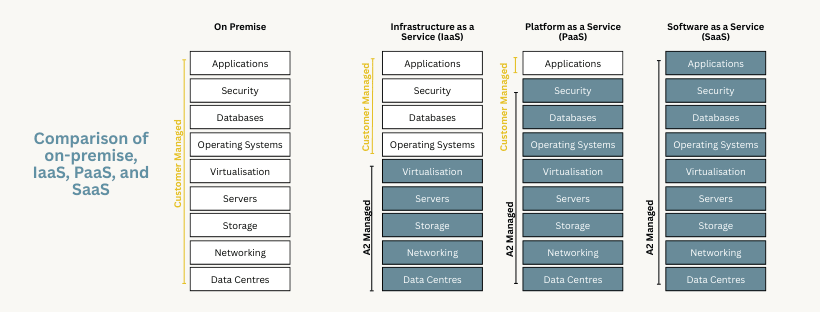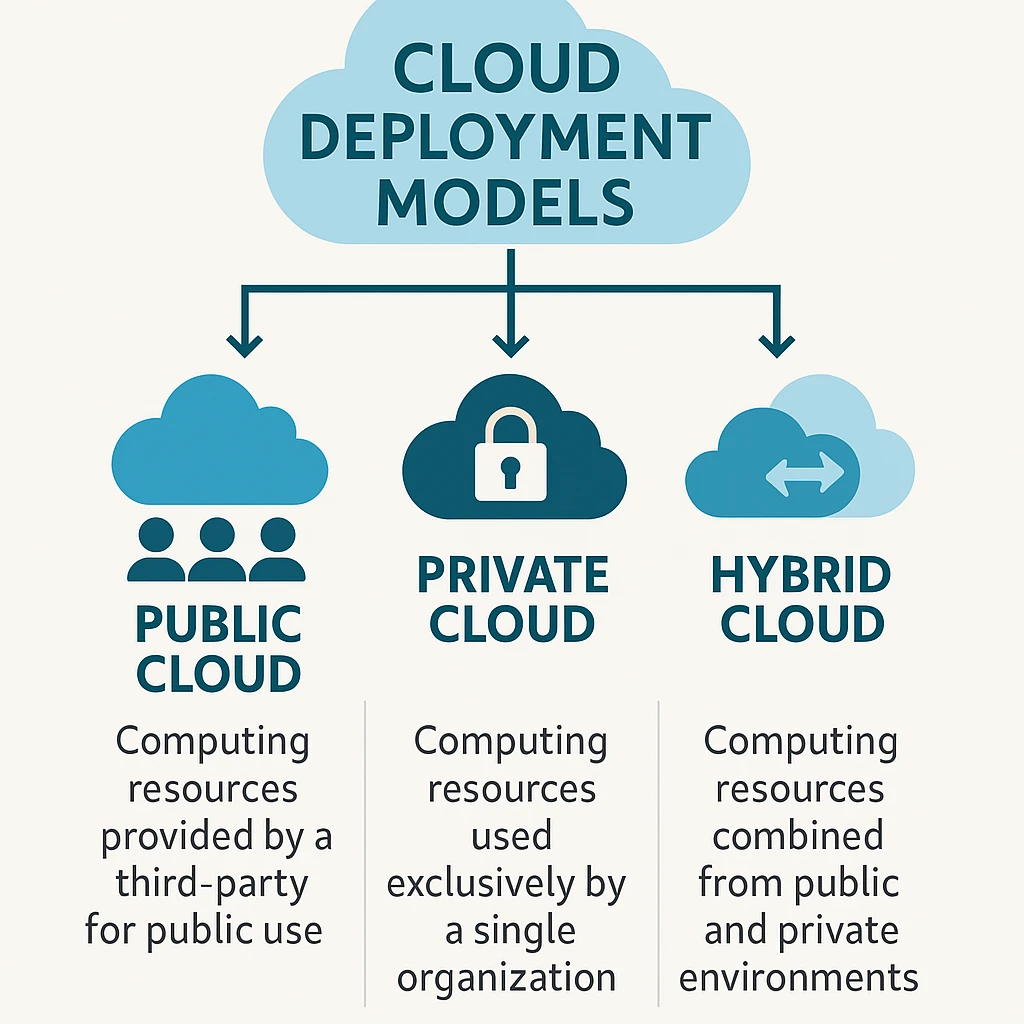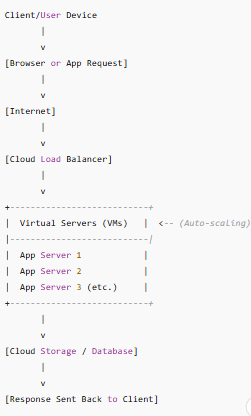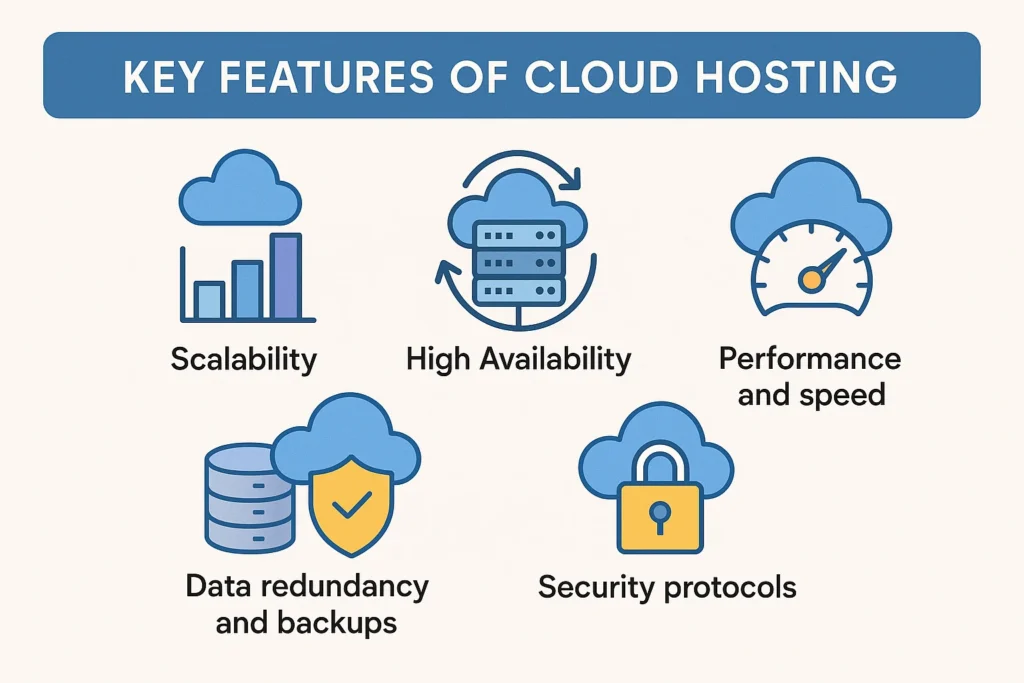Businesses and individuals are increasingly moving towards cloud hosting from traditional hosting to get the more features in managing their vital data virtually. But what is cloud hosting?
In this blog we will explore, what is cloud hosting its types, features, benefits, challenges and how its work below:
What is Cloud Hosting?
Cloud hosting is a type of computing where resources are spread over multiple servers, allowing for greater flexibility, scalability, and reliability compared to traditional hosting methods. Instead of relying on a single physical server, cloud hosting connects several servers together, ensuring your data and services remain available even if one server experiences issues.
Hence, cloud based hosting delivers higher uptime, better performance, and more resources than either shared or VPS hosting. This beats VPS in scalability. Cloud server hosting’s fundamental concept is rather straightforward: you utilize resources from several linked servers instead of renting space on one server.
What are the Types of Cloud Services
After understanding what cloud hosting is, let’s dive deeper into its three different types (IaaS, PaaS, SaaS):

- Infrastructure as a Service (IaaS): It is the internet delivery of virtualized computing resources such as servers and storage. You govern the applications and software.
- Platform as a Service (PaaS): It is a means of get access to a platform on which you can create, test, and distribute applications free from control over the underlying infrastructure.
- Software as a Service (SaaS): It delivers ready-to-use applications (such as Google Workspace or QuickBooks) online.
Summary:
| Model | You Manage | Provider Manages |
| IaaS | Apps, Data, OS | Servers, Storage, Networking |
| PaaS | Apps, Data | Everything Else |
| SaaS | Nothing (Just use the app) | Entire Stack |
READ MORE: What is Cloud Dedicated Server?
What are the Cloud Deployment Models
Understanding what are cloud hosting deployment model helps you choose the right environment:

- Public Cloud: Several customers share resources. It is perfect for small firms or startups and is affordable.
- Private Cloud: Perfect for businesses, this dedicated infrastructure provides more control and security.
- Hybrid Cloud: It combines public and private settings. Excellent for businesses seeking both flexibility and control.
READ MORE: What is Cloud Storage?
How Does Cloud Hosting Work?
To truly understand what is managed cloud hosting, you need to know the backend processes.

Your website or application is hosted using cloud hosting via several servers cooperating. This arrangement makes use of:
- Load Balancing: It helps to spread traffic evenly so that no one server gets overloaded.
- Data Redundancy: Stores duplicates of your information on several servers to guard against loss.
- Virtualization: It divides a single physical server into several virtual spaces.
This all guarantees your data stays online and runs great under any situation.
Key Features of Cloud Hosting
Here are the standout features of cloud hosting explained in simple terms:

- Scalability: allows you to add or take resources as required without interruption.
- High Availability: Many servers imply more uptime—one server can fail.
- Data redundancy and backups: for additional security, your data is stored and kept on several servers.
- Performance and speed: Sites load times can be enhanced by drawing on several servers.
- Security Protocols: Firewalls, encryption, and monitoring help to safeguard your data.
Benefits of Cloud Hosting
What is cloud hosting used for? It’s perfect for businesses that need flexibility, security, and constant uptime.
More companies are moving to the cloud for the following reasons:
- Flexible Resources: You can adapt during low traffic and high traffic.
- Cost-effective: You pay only for what you use; no hardware purchase and maintenance is required.
- Better Uptime: Server redundancy helps to reduce downtime.
- Global Reach: CDNs help your site load quicker everywhere in the world.
- Disaster Recovery: Automatic backups and far-flung redundancy guard your information from significant failures.
What Are the Potential Challenges of Cloud Hosting?
Cloud hosting offers a lot of advantages but also presents difficulties:
- Complex Pricing Models: Knowing the billing system can be difficult in complicated pricing models.
- Data Privacy Concerns: Regulations mandate protection of sensitive data.
- Internet Dependency: Accessing cloud data could prove challenging without a reliable connection.
- Limited Control in Public Cloud: You lack complete infrastructural control.
Despite these challenges, with the right provider, the risks are minimal and manageable.
Who Should Use Cloud Hosting?
Cloud hosting is ideal for:
- Startups and expanding companies needing space to grow.
- eCommerce sites needing safe transactions and great uptime.
- SaaS companies hosting online applications.
- Agencies overseeing several client apps or websites.
When comparing cloud hosting vs. web hosting, the cloud is better for businesses that expect growth, traffic spikes, or remote teams.
Future of Cloud Hosting
Rising technologies affecting cloud hosting
- AI and Machine Learning: Hosting systems today apply artificial intelligence to forecast traffic volumes and maximize performance.
- Edge Computing: Brings data nearer to users for quicker processing and lower latency.
- Serverless Architecture: With serverless architecture, developers can create applications without any server management, therefore increasing and more flexibly hosting’s availability.
Let’s take a look at some global statistics (Year-wise) that show why cloud hosting is the future in the coming years!
Here’s a year-wise breakdown of the growth and statistics for cloud hosting:
| Year | Cloud Computing Market Size | Adoption Rates | Public Cloud vs Private Cloud |
| 2020 | $360 billion | 90% of enterprises using at least one cloud service | Public cloud leading, with 60% adoption of private cloud for certain industries |
| 2021 | $400 billion | Multi-cloud adoption growing to 80% | Public cloud dominating, with increasing private cloud adoption in regulated sectors |
| 2022 | $480 billion | 94% of enterprises using cloud services | Public cloud dominant, private cloud growth in industries like healthcare and finance |
| 2023 | $500 billion | Multi-cloud adoption exceeds 89% | WS, Azure, Google Cloud continue dominance, more SMBs shifting to public cloud |
| 2024 | $520 billion | 90%+ of enterprises using some form of cloud | Public cloud adoption continues, private cloud for highly regulated sectors |
| 2025 | $600 billion | Cloud adoption nearing 95% of enterprises | Public cloud leading, but private cloud gaining traction in highly regulated industries |
Why Choose A2 Cloud Hosting Services?
A2 Cloud Hosting Services offers dependable, safe, totally managed cloud solutions meant for accountants, tax companies, and small businesses.
Hosting alone won’t give you peace of mind; we will.
What is managed cloud hosting to us means handling everything for you: setup, support, backups, and updates.
Here is what makes us unique:
- Lightning-quick performance and 99.99% uptime
- Accounting software including QuickBooks, Drake, Lacerte, and others receives committed support.
- Instant Scalability to accompany your expansion.
- Daily backups and enterprise-level data security.
Whether you are a small financial company or a lone CPA, we are here to help your business run itself.
Cloud Hosting vs. Other Hosting Types
Traditional hosting systems usually provide fixed server capacities, cloud hosting offers flexible, on-demand resources, below we will discuss the main differences between these two kinds of hosting.
| Feature | Shared Hosting | VPS Hosting | Dedicated Hosting | Cloud Hosting |
| Scalability | Low | Medium | Low | Low |
| Performance | Basic | Basic | Basic | Basic |
| Cost | Low | Medium | High | Flexible |
| Uptime | Fair | Good | Good | Best |
| Setup Time | Quick | Quick | Quick | Quick |
Conclusion
Hopefully, through this blog, you now understand what is cloud hosting, along with its benefits and uses. It has been changing the way businesses and individuals manage their data from any corner of the world. Whether you choose any type of service (IaaS, PaaS, SaaS) or a deployment model (public, private, hybrid), cloud computing delivers services with flexibility, scalability, and data redundancy.
If you’re ready to experience the full potential of cloud hosting, A2 Cloud Hosting Services is here to support you every step of the way.
Contact our cloud hosting provider at +1 (800) 217-0394 to learn how our fully managed, secure, and scalable cloud hosting solutions can help your business reach new heights!
FAQs
Where is the cloud hosted?
Cloud hosting is provided through a network of data centers located around the world. Your data is stored on multiple virtual servers that run on physical machines inside these secure data centers. This setup allows access to your applications and websites from anywhere with an internet connection.
What is cloud web hosting?
Cloud web hosting is a type of hosting where your website’s data and files are stored across several connected servers instead of just one. This ensures better performance, uptime, and flexibility compared to traditional web hosting methods.
What is a cloud hosting platform?
A cloud hosting platform is the technology and infrastructure that supports cloud computing. It includes the network of servers, virtualization software, and tools used to manage and deliver resources like storage, memory, and processing power to hosted websites and applications.
Is Cloud Computing Secure?
Yes—check below, how it is secur :
1- End-to-end encryption
2- Multi-factor authentication (MFA)
3- Role-based access control
4- Regular audits and compliance standards (GDPR, HIPAA, ISO)

Brown Lopez is a Cloud Engineer and technical writer based in Austin, USA, who enjoys turning complex cloud ideas into clear, simple insights. With solid experience in cloud architecture and real-world projects, he loves creating practical content that helps professionals understand, build, and improve their cloud solutions with confidence.